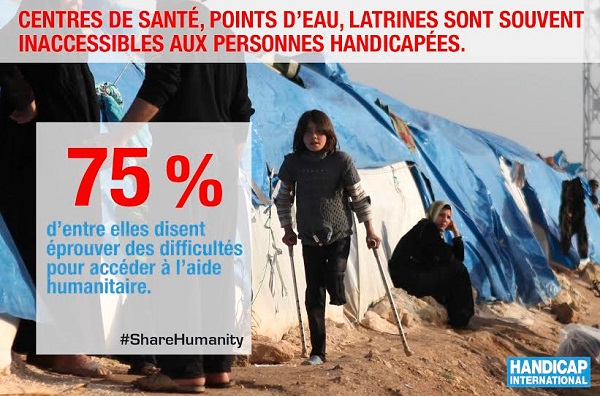
Handicap International has called on states, humanitarian organisations and financial backers to adopt the Charter on Inclusion of Persons with Disabilities in Humanitarian Action which will be presented at the World Humanitarian Summit taking place in Istanbul on 23 and 24 May 2016.
Luxembourg Prime Minister, Xavier Betterl, and Minister for Cooperation and Humanitarian Action, Romain Schneider, have already confirmed their participation in the summit, which Handicap International has described as a "unique opportunity for the needs of millions of disabled people affected by humanitarian crises to be better taken into account".
A national charter will also be developed and opened for signature to Luxembourg NGOs, comprising initiatives, the number of signatures for which, will determine the actual impact on the living conditions of disabled people in a crisis situation.
Several thousand humanitarian players including NGOs, states, donors and UN agencies are expected at the Summot, which has been organised at the initiative of the UN Secretary-General, Ban Ki-Moon.
One of the 15 special sessions, taking place on 23 May 2016, will be devoted to the inclusion of disabled people in humanitarian aid. The session is the result of collaboration between various disability organisations, with the support of a small group of NGOs and states and based on the premise that the barriers faced by disabled people in accessing help need to be addressed.
The Charter, coordinated by Handicap International, will be launched during the session. The signatories will commit to five principles to deliver more includive aid: the non-discrimination and respect for the diversity of people with disabilities; the participation of disabled persons in humanitarian programme design; the provision of inclusive services; the implementation of inclusive world policies; and the cooperation and coordination among humanitarian actors to improve the inclusion of people with disabilities. The Charter will be opened to signatures to states, NGOs and humanitarian aid funders and is accompanied by an action plan for its implementation.
Handicap International highlighted the fact that an estimated 20 million people with disabilities are currently facing a humanitarian crisis and as an already marginalised demographic in their communities of origin, fleeing a disaster zone and accessing humanitarian aid may prove for more difficult than for an able-bodied person.
Despite this, their rights and needs are often inadequately addressed. According to the survey "Disability in Humanitarian Context" conducted by Handicap International during the first half of 2015, three-quarters of disabled respondents affected by humanitarian crises feel that they have not been given proper access to basic assistance, such as water, food shelter and medical care, whilst half of those asked reported a lack of access to specific care including rehabilitation and mobility aids.
"The implementation of this Charter and the development of a Charter at the Luxembourg level will be a major step towards more impartial and more effective aid," commented Martin Lagneau, Director at Handicap International Luxembourg. "For the first time, NGOs, states and humanitarian aid donors are assembling to better take into account the rights and needs of persons with disabilities during humanitarian emergencies. The way that these people can be left behind in an emergency response constitutes an injustice: it is now on its way to being repaired."
Photo by HI/Armelle Toucour








